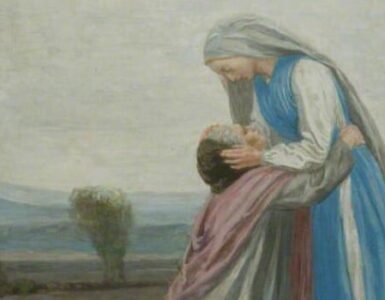Anthony was born in Upper Egypt to wealthy Christian parents in the year 251. Around the year 269, his parents died and left him and his sister a sizable inheritance, including three hundred acres of land. One day when he was attending Mass he heard the Scripture reading from Matthew 19:21: “If you wish to be perfect, go, sell your possessions, and give the money to the poor, and you will have treasure in heaven; then come, follow me.”
Anthony wasted no time giving away his property and inheritance, keeping only enough to meet the most basic needs of himself and his sister. Then at another Mass, he heard a different Scripture reading: “So do not worry about tomorrow, for tomorrow will bring worries of its own. Today’s trouble is enough for today” (Mt 6:34). Anthony then gave away the rest of what he had, placed his sister in a convent under the care of the nuns and went to live a life of prayer, fasting, and manual labor.
Anthony always strove to do more to become holy. For a time, he lived enclosed in a tomb in a cemetery near Koman. His reputation as a wise man grew, however, and people came to seek his advice. He brought about healings and his popularity continued to grow until he decided to move into the desert for fear that he might become prideful or that people would worship him rather than God. He lived in the desert for 20 years, locked in a small fort atop Mount Pispir, in complete solitude. He wrestled with temptations from the evil one the entire time. He had anxieties about his sister, missed his relatives, and longed for company. Satan caused him to think that he may have made the wrong choice and should perhaps have used his inheritance for some better purpose.
He fought off such thoughts and temptations and continued to pray and fast to beat the devil. People continually came and tried to talk to him, but he refused to come out until one day they broke down the door. Anthony emerged and some who talked with him were healed, others were comforted by his words and others stayed to learn from him. Those who stayed formed the first Christian monastery, although it is not like a monastery today in that these monks lived separately and would come together and listen to Anthony. Before long, more and more people were coming to hear him, so he had friends take him deeper into the desert to a mountain oasis. They continued bringing him bread since that was all he would eat. It wasn’t long, however, before people found him and again started coming in great numbers.
On one occasion two Greek philosophers came. They had heard about this strange and holy man who wore an animal skin, didn’t bathe and lived only on bread and water. Anthony was Egyptian and had not even attended school. These men were well-educated and spoke many languages. Anthony had to have an interpreter to talk to them. He asked them why they had ventured out into the desert to see such a foolish man. These great philosophers, however, held Anthony in great esteem. They had heard how people came from far and wide to learn from him and how great miracles had occurred around him, including healings. So they assured him that they came because he was a wise man from whom they wanted to learn. Anthony, however, knew that they wanted to hear arguments for the truths of Christianity and to debate him. So he told them, “If you think me wise, become what I am, for we ought to imitate the good. Had I gone to you, I should have imitated you, but since you have come to me, become what I am, for I am a Christian.”
In the year 311, when persecution of Christianity was so rampant under the rule of Emperor Maximin, Anthony went to Alexandria to encourage the faithful. When the persecutions subsided, he organized another monastery at Pispir and afterward retired to Mount Kolzim near the Red Sea with a disciple, Macarius. Once more, around the year 355, he went to Alexandria to help his good friend St. Anthanasius combat Arianism. He then retired to a cave on Mount Kolzim where he received visitors until his death at the age of 105, in the year 356. He is the patron saint of grave-diggers.
From Johnnette Benkovic’s Graceful Living: Meditations to Help You Grow Closer to God Day by Day

Indeed, he was so attentive when Scripture was read that nothing escaped him, and because he retained all he heard, his memory served him in place of books.
— From a life of St. Anthony by St. Athanasius
How attentive am I when I hear Sacred Scripture being read? Could I pass a pop quiz on the passage as soon as it is read? How about twenty-four hours later? How can I seek to be more attentive?
Lessons
As stated above, Saint Athanasius was a friend of Anthony’s and also his biographer. In his biography St. Athanasius wrote: “Anthony was not known for his writings nor for his worldly wisdom nor for any art, but simply for his reverence toward God.”
Prayer
St. Anthony, you truly lived the life of holiness. As St. James said in his epistle: “Be doers of the word and not hearers only.” We pray that your life will inspire others to put their faith into action. Amen.
✠
image: St. Anthony the Great, Ikon from the 17th century Cretan School / Wikimedia Commons (Public Domain)













